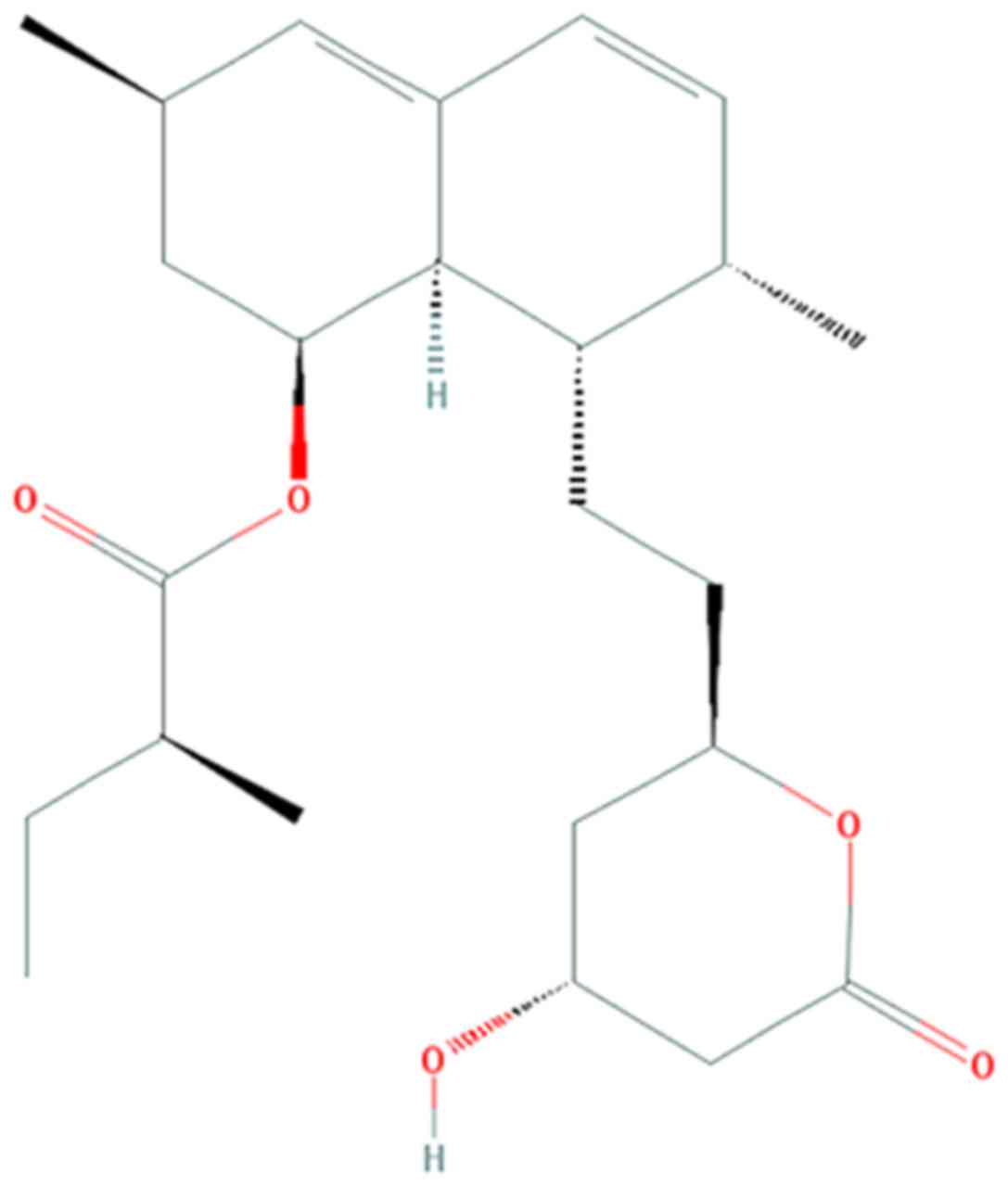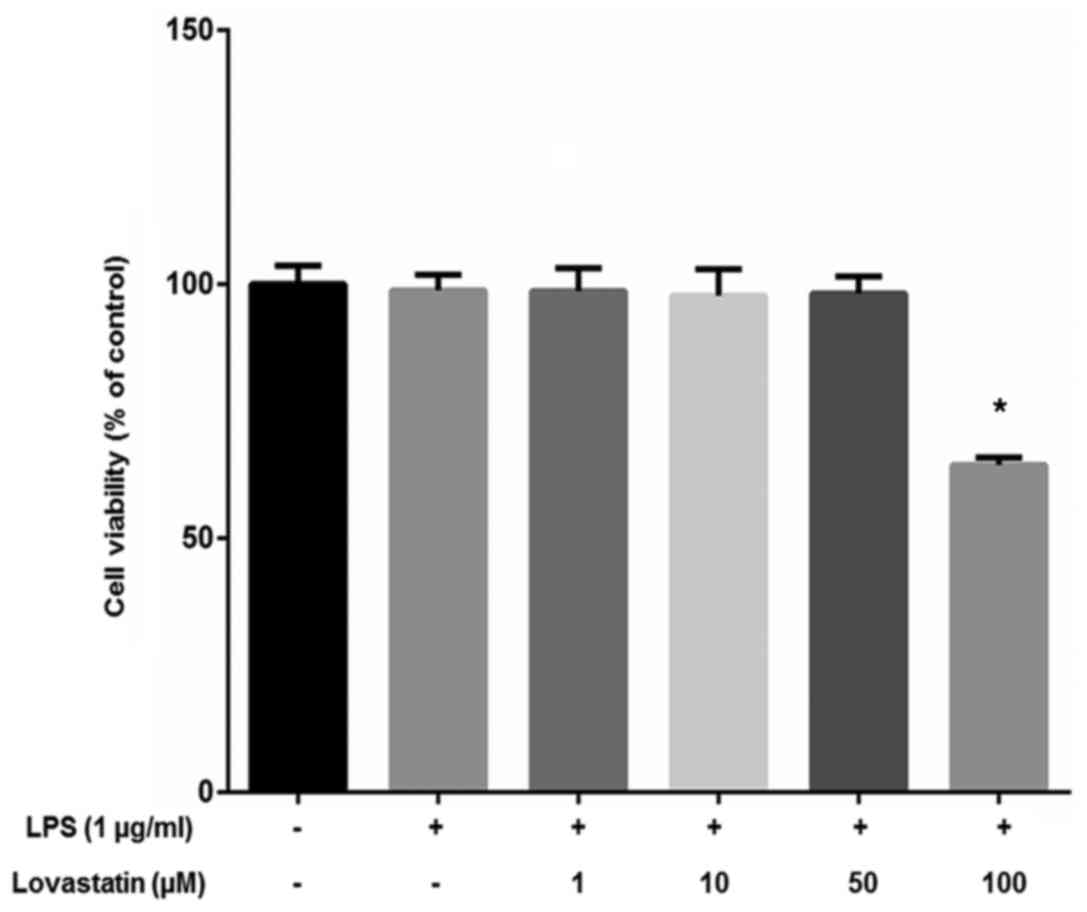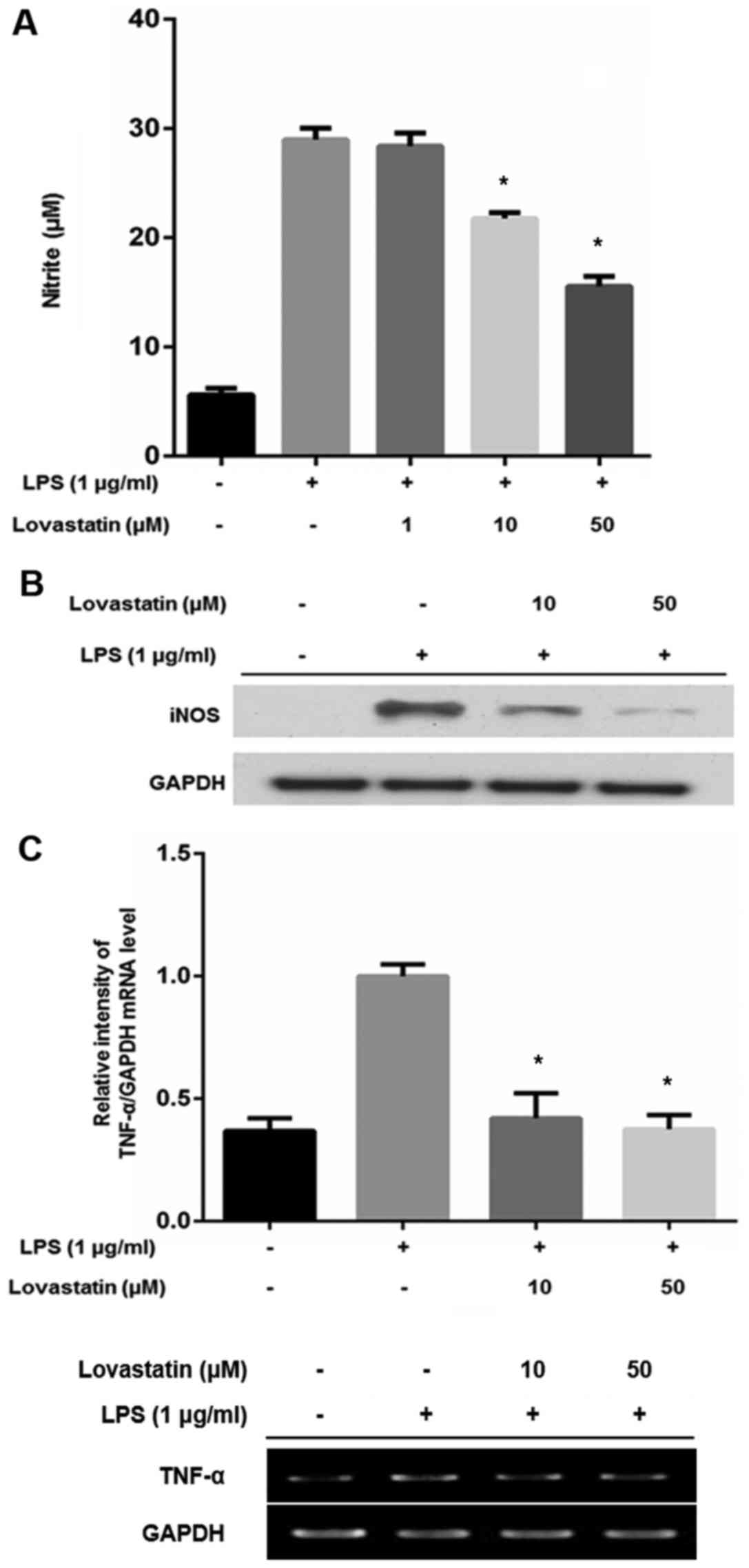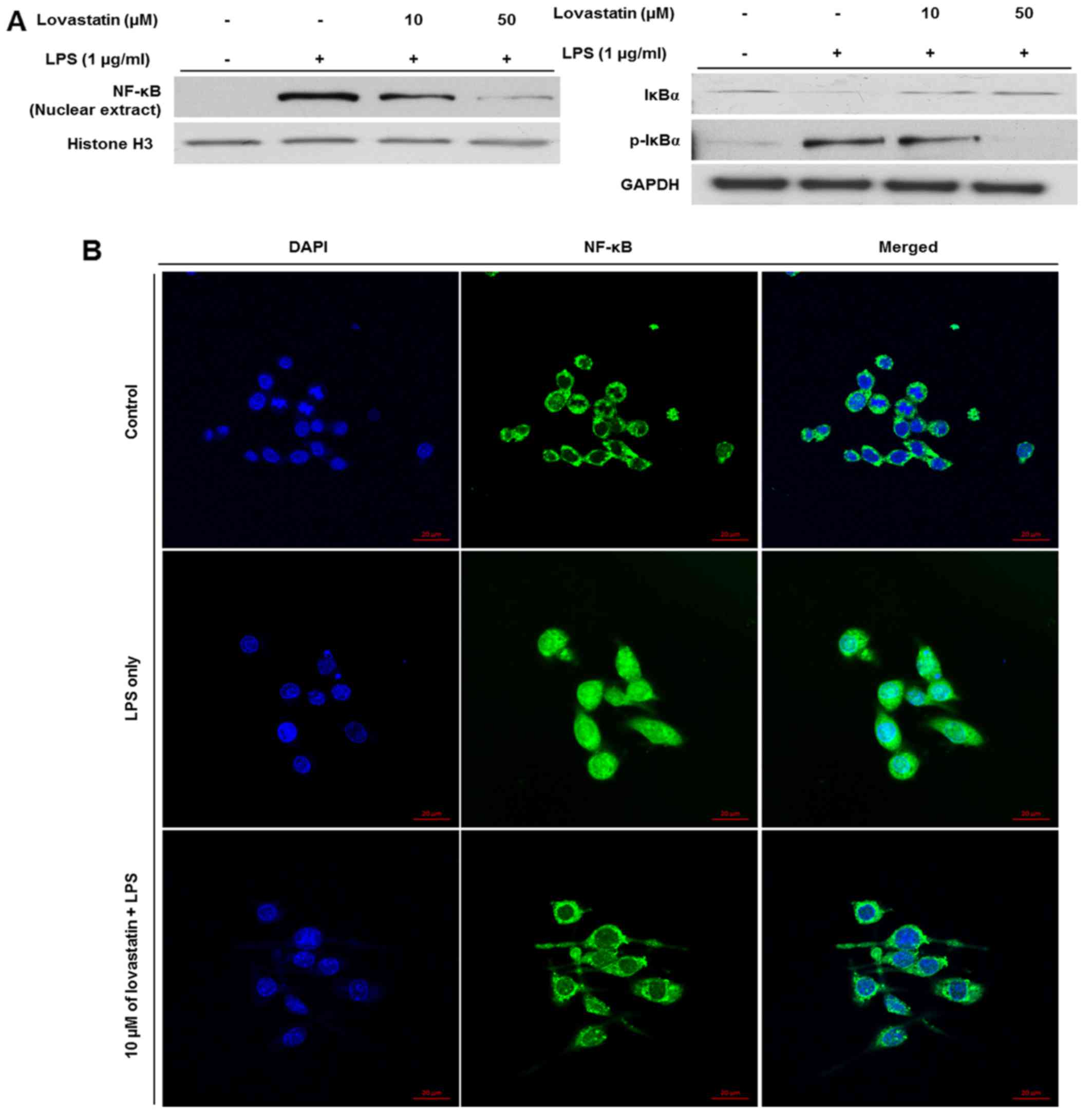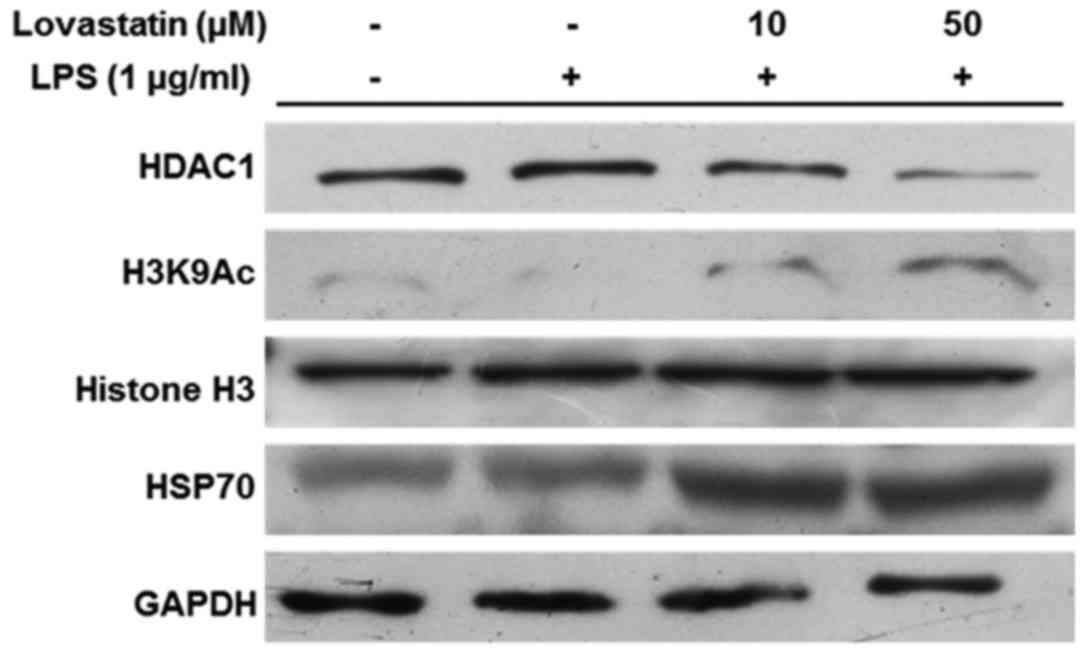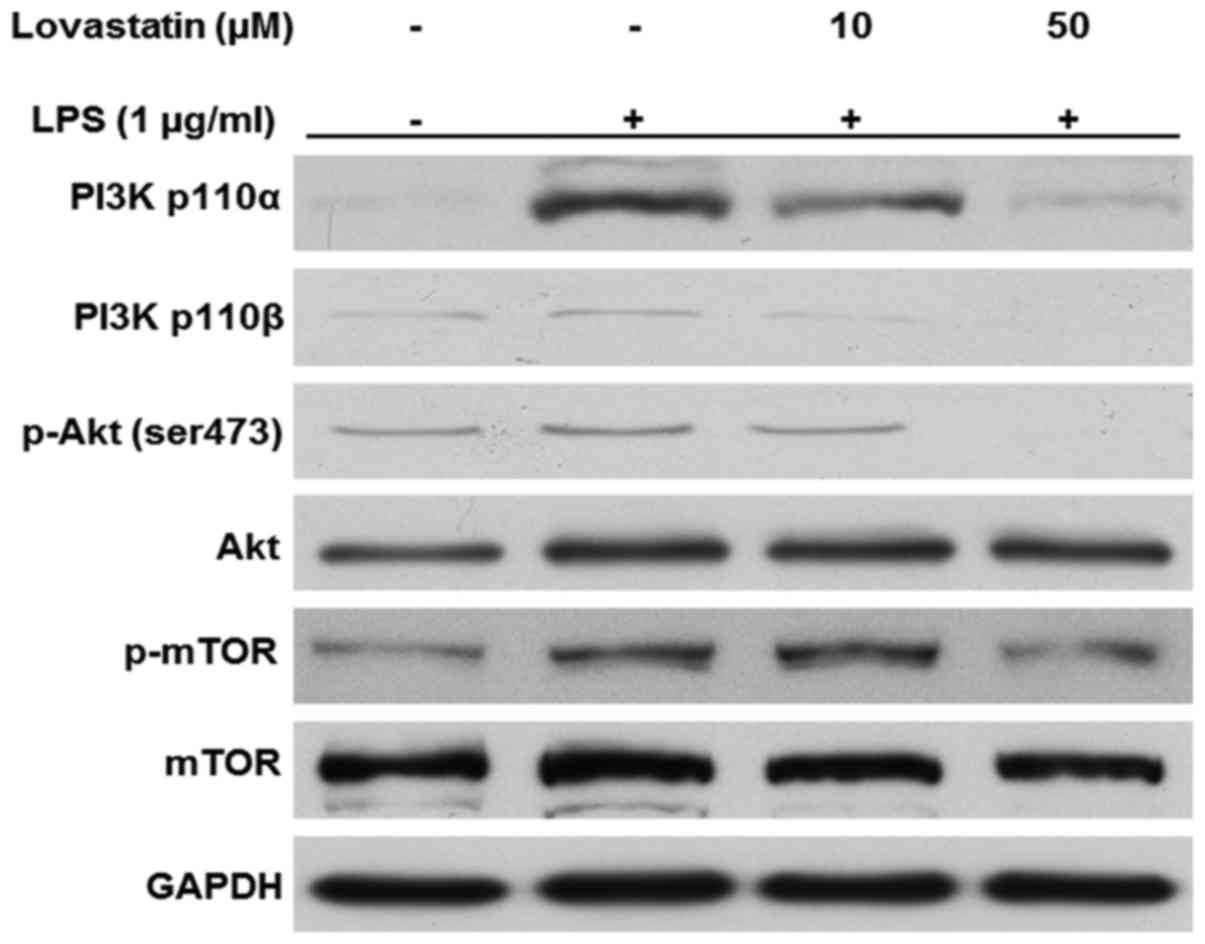|
1
|
Umamaheswari S and Sangeetha KS:
Anti-Inflammatory Effect of Selected Dihydroxyflavones. J Clin
Diagn Res. 9:FF05–FF07. 2015.PubMed/NCBI
|
|
2
|
Paradise WA, Vesper BJ, Goel A, Waltonen
JD, Altman KW, Haines GK and Radosevich JA: Nitric oxide:
Perspectives and emerging studies of a well known cytotoxin. Int J
Mol Sci. 11:2715–2745. 2010. View Article : Google Scholar : PubMed/NCBI
|
|
3
|
Peng XX, Zhang SH, Wang XL, Ye TJ, Li H,
Yan XF, Wei L, Wu ZP, Hu J, Zou CP, et al: Panax Notoginseng flower
saponins (PNFS) inhibit LPS-stimulated NO overproduction and iNOS
gene overexpression via the suppression of TLR4-mediated
MAPK/NF-kappa B signaling pathways in RAW264.7 macrophages. Chin
Med. 10:152015. View Article : Google Scholar : PubMed/NCBI
|
|
4
|
Medicherla K, Sahu BD, Kuncha M, Kumar JM,
Sudhakar G and Sistla R: Oral administration of geraniol
ameliorates acute experimental murine colitis by inhibiting
pro-inflammatory cytokines and NF-κB signaling. Food Funct.
6:2984–2995. 2015. View Article : Google Scholar : PubMed/NCBI
|
|
5
|
Salminen A, Paimela T, Suuronen T and
Kaarniranta K: Innate immunity meets with cellular stress at the
IKK complex: Regulation of the IKK complex by HSP70 and HSP90.
Immunol Lett. 117:9–15. 2008. View Article : Google Scholar : PubMed/NCBI
|
|
6
|
Hao NB, Tang B, Wang GZ, Xie R, Hu CJ,
Wang SM, Wu YY, Liu E, Xie X and Yang SM: Hepatocyte growth factor
(HGF) upregulates heparanase expression via the PI3K/Akt/NF-κB
signaling pathway for gastric cancer metastasis. Cancer Lett.
361:57–66. 2015. View Article : Google Scholar : PubMed/NCBI
|
|
7
|
Ito K, Charron CE and Adcock IM: Impact of
protein acetylation in inflammatory lung diseases. Pharmacol Ther.
116:249–265. 2007. View Article : Google Scholar : PubMed/NCBI
|
|
8
|
Marinova Z, Ren M, Wendland JR, Leng Y,
Liang MH, Yasuda S, Leeds P and Chuang DM: Valproic acid induces
functional heat-shock protein 70 via Class I histone deacetylase
inhibition in cortical neurons: A potential role of Sp1
acetylation. J Neurochem. 111:976–987. 2009. View Article : Google Scholar : PubMed/NCBI
|
|
9
|
Zhao Y, Zhang C, Huang Y, Yu Y, Li R, Li
M, Liu N, Liu P and Qiao J: Up-regulated expression of WNT5a
increases inflammation and oxidative stress via PI3K/AKT/NF-κB
signaling in the granulosa cells of PCOS patients. J Clin
Endocrinol Metab. 100:201–211. 2015. View Article : Google Scholar
|
|
10
|
Pan H, Xu LH, Ouyang DY, Wang Y, Zha QB,
Hou XF and He XH: The second-generation mTOR kinase inhibitor
INK128 exhibits anti-inflammatory activity in
lipopolysaccharide-activated RAW264.7 cells. Inflammation.
37:756–765. 2014. View Article : Google Scholar : PubMed/NCBI
|
|
11
|
Alarcón J, Aguila S, Arancibia-Avila P,
Fuentes O, Zamorano-Ponce E and Hernández M: Production and
purification of statins from Pleurotus ostreatus (Basidiomycetes)
strains. Z Naturforsch C. 58:62–64. 2003. View Article : Google Scholar : PubMed/NCBI
|
|
12
|
Lin YC, Lin JH, Chou CW, Chang YF, Yeh SH
and Chen CC: Statins increase p21 through inhibition of histone
deacetylase activity and release of promoter-associated HDAC1/2.
Cancer Res. 68:2375–2383. 2008. View Article : Google Scholar : PubMed/NCBI
|
|
13
|
Guo W, Liu H, Li L, Yang M and Du A:
Regulation of lovastatin on a key inflammation-related microRNA in
myocardial cells. Chin Med J (Engl). 127:2977–2981. 2014.
|
|
14
|
van Loo G and Beyaert R: Negative
regulation of NF-κB and its involvement in rheumatoid arthritis.
Arthritis Res Ther. 13:2212011. View
Article : Google Scholar
|
|
15
|
Gveric D, Kaltschmidt C, Cuzner ML and
Newcombe J: Transcription factor NF-kappaB and inhibitor I
kappaBalpha are localized in macrophages in active multiple
sclerosis lesions. J Neuropathol Exp Neurol. 57:168–178. 1998.
View Article : Google Scholar : PubMed/NCBI
|
|
16
|
Trujillo-Gonzalez I, Cervantes-Roldan R,
Gonzalez-Noriega A, Michalak C, Reyes-Carmona S, Barrios-Garcia T,
Meneses-Morales I and Leon-Del-Rio A: Holocarboxylase synthetase
acts as a biotin-independent transcriptional repressor interacting
with HDAC1, HDAC2 and HDAC7. Mol Genet Metab. 111:321–330. 2014.
View Article : Google Scholar
|
|
17
|
de Jong PR, Schadenberg AW, Jansen NJ and
Prakken BJ: Hsp70 and cardiac surgery: Molecular chaperone and
inflammatory regulator with compartmentalized effects. Cell Stress
Chaperones. 14:117–131. 2009. View Article : Google Scholar :
|
|
18
|
Jeong EJ, Seo H, Yang H, Kim J, Sung SH
and Kim YC: Anti-inflammatory phenolics isolated from Juniperus
rigida leaves and twigs in lipopolysaccharide-stimulated RAW264.7
macrophage cells. J Enzyme Inhib Med Chem. 27:875–879. 2012.
View Article : Google Scholar
|
|
19
|
Piwowarski JP, Kiss AK, Granica S and
Moeslinger T: Urolithins, gut microbiota-derived metabolites of
ellagitannins, inhibit LPS-induced inflammation in RAW 264.7 murine
macrophages. Mol Nutr Food Res. 59:2168–2177. 2015. View Article : Google Scholar : PubMed/NCBI
|
|
20
|
Yu PJ, Jin H, Zhang JY, Wang GF, Li JR,
Zhu ZG, Tian YX, Wu SY, Xu W, Zhang JJ, et al: Pyranocoumarins
isolated from Peucedanum praeruptorum Dunn suppress
lipopolysaccharide-induced inflammatory response in murine
macrophages through inhibition of NF-κB and STAT3 activation.
Inflammation. 35:967–977. 2012. View Article : Google Scholar
|
|
21
|
Mulder KC, Mulinari F, Franco OL, Soares
MS, Magalhães BS and Parachin NS: Lovastatin production: From
molecular basis to industrial process optimization. Biotechnol Adv.
33:648–665. 2015. View Article : Google Scholar : PubMed/NCBI
|
|
22
|
Gillenwater AM, Zhong M and Lotan R:
Histone deacetylase inhibitor suberoylanilide hydroxamic acid
induces apoptosis through both mitochondrial and Fas (Cd95)
signaling in head and neck squamous carcinoma cells. Mol Cancer
Ther. 6:2967–2975. 2007. View Article : Google Scholar : PubMed/NCBI
|
|
23
|
Cantley MD, Fairlie DP, Bartold PM, Marino
V, Gupta PK and Haynes DR: Inhibiting histone deacetylase 1
suppresses both inflammation and bone loss in arthritis.
Rheumatology (Oxford). 54:1713–1723. 2015. View Article : Google Scholar
|
|
24
|
Jayasooriya RG, Lee KT, Kang CH, Dilshara
MG, Lee HJ, Choi YH, Choi IW and Kim GY: Isobutyrylshikonin
inhibits lipopolysaccharide-induced nitric oxide and prostaglandin
E2 production in BV2 microglial cells by suppressing the
PI3K/Akt-mediated nuclear transcription factor-κB pathway. Nutr
Res. 34:1111–1119. 2014. View Article : Google Scholar : PubMed/NCBI
|
|
25
|
Stark A, Sriskantharajah S, Hessel EM and
Okkenhaug K: PI3K inhibitors in inflammation, autoimmunity and
cancer. Curr Opin Pharmacol. 23:82–91. 2015. View Article : Google Scholar : PubMed/NCBI
|
|
26
|
Schabbauer G, Tencati M, Pedersen B,
Pawlinski R and Mackman N: PI3K-Akt pathway suppresses coagulation
and inflammation in endotoxemic mice. Arterioscler Thromb Vasc
Biol. 24:1963–1969. 2004. View Article : Google Scholar : PubMed/NCBI
|
|
27
|
Hawkins PT and Stephens LR: PI3K
signalling in inflammation. Biochim Biophys Acta. 1851:882–897.
2015. View Article : Google Scholar
|
|
28
|
Predonzani A, Calì B, Agnellini AH and
Molon B: Spotlights on immunological effects of reactive nitrogen
species: When inflammation says nitric oxide. World J Exp Med.
5:64–76. 2015. View Article : Google Scholar : PubMed/NCBI
|
|
29
|
Liu PW, Chen MF, Tsai AP and Lee TJ: STAT1
mediates oroxylin a inhibition of iNOS and pro-inflammatory
cytokines expression in microglial BV-2 cells. PLoS One.
7:e503632012. View Article : Google Scholar : PubMed/NCBI
|
|
30
|
Zhu J, Zhang Y, Wu G, Xiao Z, Zhou H and
Yu X: Inhibitory effects of oligochitosan on TNF-α, IL-1β and
nitric oxide production in lipopolysaccharide-induced RAW264.7
cells. Mol Med Rep. 11:729–733. 2015. View Article : Google Scholar
|
|
31
|
Jung YC, Kim ME, Yoon JH, Park PR, Youn
HY, Lee HW and Lee JS: Anti-inflammatory effects of galangin on
lipopolysaccharide-activated macrophages via ERK and NF-κB pathway
regulation. Immunopharmacol Immunotoxicol. 36:426–432. 2014.
View Article : Google Scholar : PubMed/NCBI
|
|
32
|
Mo XM and Sun HX: The Anti-inflammatory
effect of the CXCR4 antagonist-N15P peptide and its modulation on
inflammation-associated mediators in LPS-induced PBMC.
Inflammation. 38:1374–1383. 2015. View Article : Google Scholar : PubMed/NCBI
|
|
33
|
Chun JM, Nho KJ, Kim HS, Lee AY, Moon BC
and Kim HK: An ethyl acetate fraction derived from Houttuynia
cordata extract inhibits the production of inflammatory markers by
suppressing NF-κB and MAPK activation in
lipopolysaccharide-stimulated RAW 264.7 macrophages. BMC Complement
Altern Med. 14:2342014. View Article : Google Scholar
|
|
34
|
Kim J, Han AR, Park EY, Kim JY, Cho W, Lee
J, Seo EK and Lee KT: Inhibition of LPS-induced iNOS, COX-2 and
cytokines expression by poncirin through the NF-kappaB inactivation
in RAW 264.7 macrophage cells. Biol Pharm Bull. 30:2345–2351. 2007.
View Article : Google Scholar : PubMed/NCBI
|
|
35
|
Aktan F: iNOS-mediated nitric oxide
production and its regulation. Life Sci. 75:639–653. 2004.
View Article : Google Scholar : PubMed/NCBI
|
|
36
|
Magnani M, Crinelli R, Bianchi M and
Antonelli A: The ubiquitin-dependent proteolytic system and other
potential targets for the modulation of nuclear factor-κB (NF-κB).
Curr Drug Targets. 1:387–399. 2000. View Article : Google Scholar
|
|
37
|
Hou YC, Chiu WC, Yeh CL and Yeh SL:
Glutamine modulates lipopolysaccharide-induced activation of NF-κB
via the Akt/mTOR pathway in lung epithelial cells. Am J Physiol
Lung Cell Mol Physiol. 302:L174–L183. 2012. View Article : Google Scholar
|















